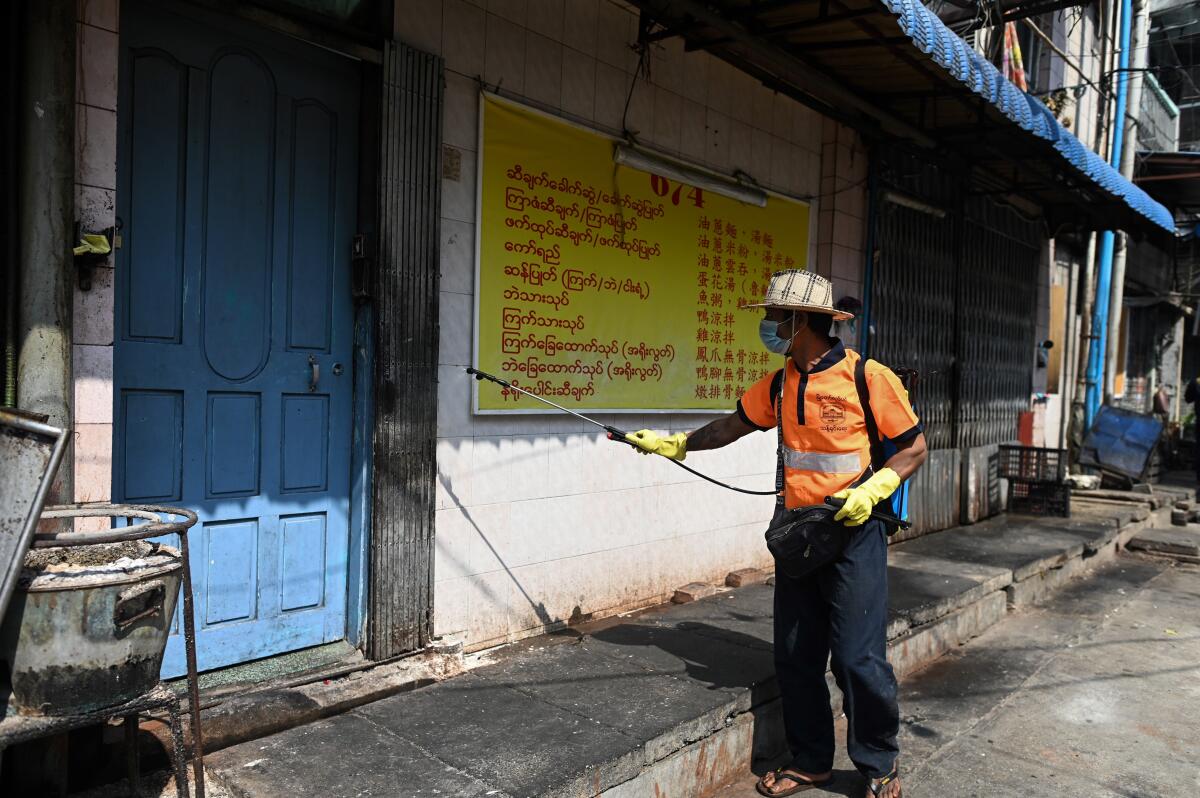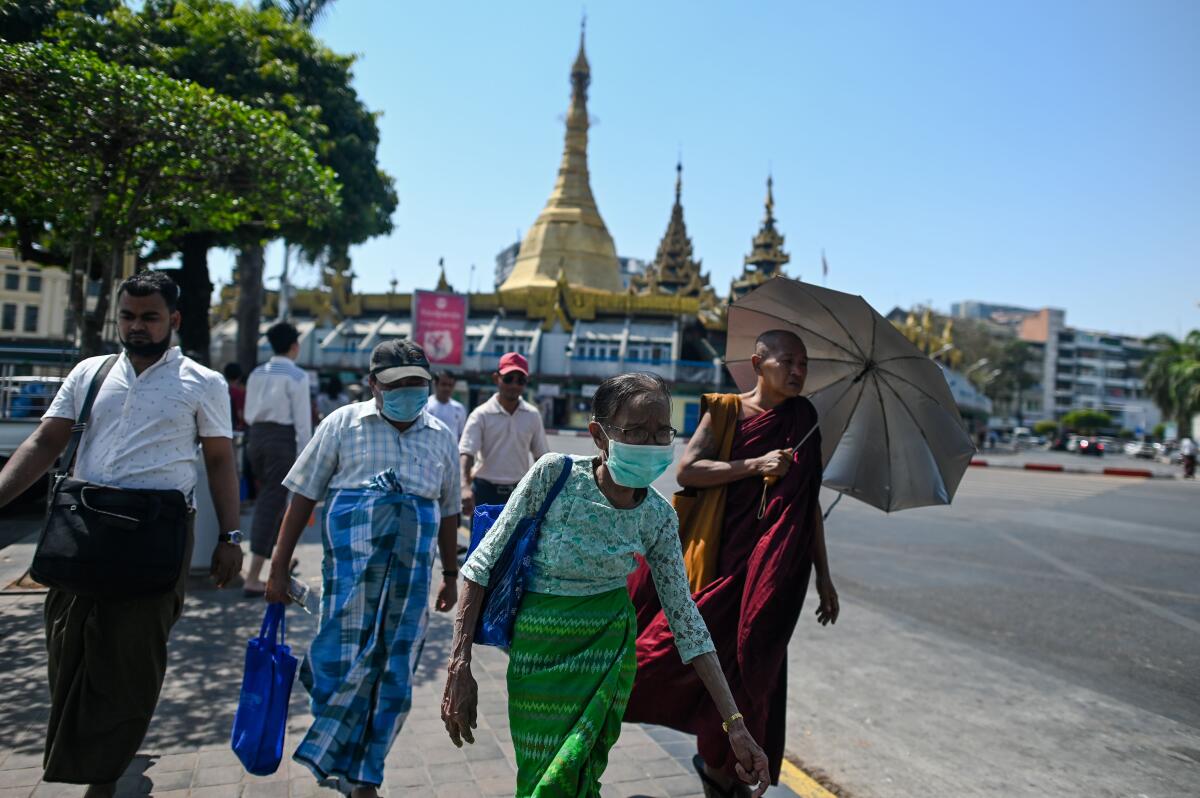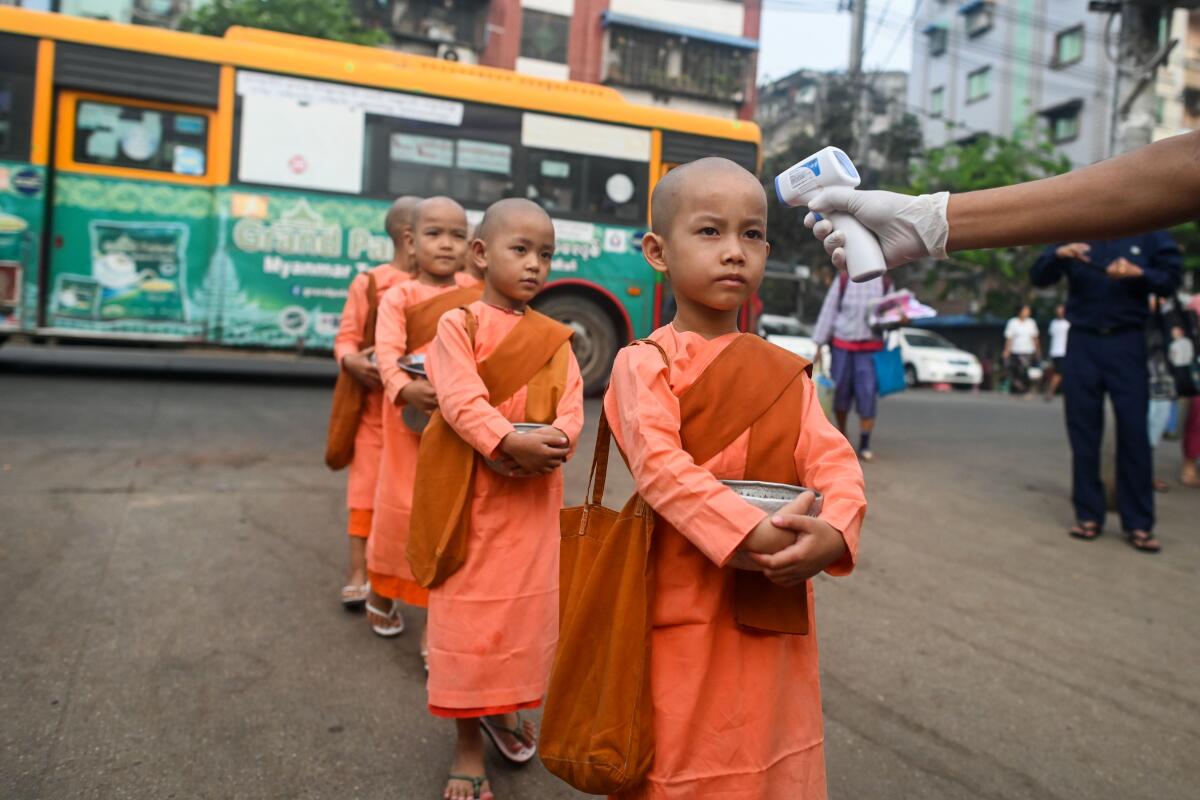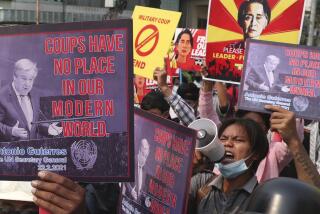Myanmar claimed to be coronavirus-free. Now cases are showing up

- Share via
YANGON, Myanmar — As its Southeast Asian neighbors counted cases of the new coronavirus in the hundreds and thousands, Myanmar recorded its first five infections this week, in patients who had recently traveled to the U.S., Britain, Australia and Singapore.
The announcements confirmed what many experts had been saying for two months: that Myanmar’s claims to have somehow escaped the pandemic, despite sharing a 1,400-mile-long border with China, could not be believed.
Two weeks ago, Myanmar’s Health Ministry said it aimed “to prevent a single citizen from contracting COVID-19.” Government spokesman Zaw Htay suggested that the “lifestyle and diet” of Myanmar’s people protected them from the novel coronavirus.
Yet there is growing suspicion that the virus has been circulating for weeks or months in this country of 54 million people — one of the poorest in Asia — given its proximity and travel and trade links with China.
Before the outbreak, more than 10,000 workers crossed the border into China daily. Myanmar had multiple direct flights each week from Wuhan, the original epicenter of the crisis. More than 300,000 Chinese tourists visited Myanmar in 2019.
“It’s possible that the coronavirus has already spread within the country and may simply remain undetected, especially if the spread is limited to remote areas where people have little or no access to proper healthcare,” said Thant Myint-U, author of “The Hidden History of Burma.”
Before any cases had been announced, the Legal Aid Network, an independent advocacy group in Myanmar, said the government’s claim to be coronavirus-free was “far from reality.” After the first cases were confirmed this week, the Burmese Rohingya Organization UK said Myanmar’s denials were “dangerous and deeply irresponsible.”
The latest updates from our reporters in California and around the world
There are signs the government has awakened to the possibility of a major outbreak.
Last week, the health ministry announced plans to test anybody with symptoms, not just those who had recently traveled to infected countries. As of Thursday, Myanmar had tested only 276 patients for the coronavirus. In a nationally televised address this week, Myanmar’s civilian leader, Aung San Suu Kyi, urged citizens not to be “filled with fear.”
“Let us meet our challenges by uniting the strength of the people and the strength of the nation,” she said.
According to the World Health Organization, Myanmar’s health system is one of the least equipped in Asia, spending only about 2% of its gross domestic product on health — less even than impoverished regional neighbors such as Laos and Cambodia. Thousands die every year from infectious diseases such as tuberculosis without ever visiting a doctor.
“Myanmar has been in a medical emergency for a very long time,” Thant Myint-U said.

Ian Henderson, director of molecular bioscience at the University of Queensland in Australia, said that Myanmar is “not equipped” to handle an outbreak and must “pursue large-scale testing of people if it hopes to contain” the coronavirus.
“If you don’t ask the question, you won’t get an answer,” he said, adding that just five weeks ago, Italy had confirmed two cases — and now has more than 80,000.
Yet it may already be too late for increased testing in Myanmar.
This month, thousands of Myanmar migrant workers in Thailand — which has recorded more than 1,000 COVID-19 infections, among the most in Southeast Asia — rushed across the border into Kayin state just before Thai authorities closed the crossing.
Migrant rights activists said the travelers were in close proximity to one another for long periods as they waited to cross, increasing the possibility of transmission. They are now dispersing throughout Myanmar, said Brahm Press, director of the Migration Assistance Program Foundation, an advocacy group.
The border closing was “premature and rushed,” Press said. “Thus, no information was given on social distancing or self-quarantine before migrants left.”
With coronavirus testing virtually nonexistent outside the commercial capital, Yangon, infected people in this population “will surely transmit to others,” he said.

The migrant workers return to a country where there were few jobs to begin with, increasing the possibility of economic hardship as the virus spreads.
“The vast majority of people depend on daily wages to feed themselves and their families that same day,” Thant Myint-U said. “And weak state institutions [mean] that the ability to substitute income or provide food directly will be limited.”
In Yangon, there is little sign that the coronavirus is affecting daily life, except that pharmacies and supermarkets are busier than usual. Sidewalks downtown remain crowded, and Suu Kyi assured the public there were no plans to shut down public services or markets.
Some bars and restaurants have closed or switched to takeout only, but those measures were voluntary, and the vast majority remain open.
Myanmar’s economy has grown over the last decade as the country began to transition away from half a century of corrupt military rule by generals who under-invested in health and education.
But a brutal 2017 military offensive against the Rohingya ethnic minority forced hundreds of thousands of people to flee the country and has damaged Myanmar in the eyes of many Western investors.
Myanmar’s government has compensated somewhat by increasing its trade links with China. But analysts said Myanmar’s initial denials of the virus were not aimed at placating Beijing — the government suspended a visa-on-arrival facility for Chinese nationals back in January, just as news of the outbreak in Wuhan emerged.
“This is a government that is not very good at handling sudden crises, and is often behind the curve,” said Yangon-based political analyst Richard Horsey. “That’s a dangerous place to be in a pandemic.”
Nachemson is a special correspondent.
More to Read
Sign up for Essential California
The most important California stories and recommendations in your inbox every morning.
You may occasionally receive promotional content from the Los Angeles Times.










